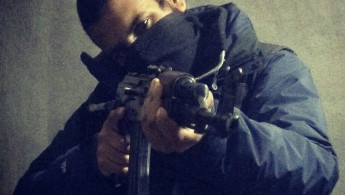British hacker for IS 'killed in US drone strike'
British-born Junaid Hussain believed to be the digital expert for so-called Cyber Caliphate run by IS was killed by a US drone strike in Syria, it was reported Thursday.
2 min read
US officials say Islamic State group's electronic expert was killed in an air strike [Twitter]
A British hacker who is believed to be the leader of the so-called "Cyber Caliphate" of the Islamic State group (IS, formerly ISIS) and its main electronic expert is believed to have been killed by a US air strike in Syria.
The 21-year-old hacker, who took the name Abu Hussain al-Britani, was born in Birmingham as Junaid Hussain and travelled to Syria to join the terrorist group in 2013, according to British daily newspaper The Guardian.
Reuters has reported information it had received from US and European officials that the US Department of Defense was probably involved in the air strike that targeted Hussain.
According to CNN, US officials have said that Hussain was specifically targeted by a drone strike on a vehicle he was traveling in after US intelligence received information about his whereabouts. They said that he was watched and was targeted after he stepped out of the vehicle, leading them to be confident that he was killed.
Twitter accounts most likely connected to IS have mentioned that Hussain's wife had denied that her husband was killed, according to Reuters.
Hussain had made several tweets urging attacks on a Prophet Mohammad cartoon drawing contest in Garland,Texas, in which participants were asked to draw Prophet Mohammad. The gunmen who were involved in the shooting wounded a security guard before they were shot dead by a Garland police officers.
Hussain had been part of the hacker group Team Poison in Britain, according to the Guardian. He was able to gain access to the address book of former Prime Minister Tony Blair and published information from it, and was jailed for six months for this crime in 2012.
Vice president of cyber security firm CrowdStrike, Adam Meyers, told Reuters: "[Hussain] wasn't a serious threat. He was most likely a nuisance hacker."
"It was his involvement in recruitment, communications and other ancillary support that would have made him a target."
Cyber Caliphate has reportedly been able to hack the Twitter and YouTube accounts of the US military's Central Command - also known as CentCom - in January, 2015. CentCom described the hack as "cyber-vandalism" and not a serious data breach.
IS' hacking division also posted threats to US President Barak Obama's family on the Twitter account of American weekly news magazine Newsweek.
This is the second time in the last ten days that a senior IS figure has been announced to be killed. The organisation's number two was killed in a US air strike near Mosul in Iraq on August 18.
The 21-year-old hacker, who took the name Abu Hussain al-Britani, was born in Birmingham as Junaid Hussain and travelled to Syria to join the terrorist group in 2013, according to British daily newspaper The Guardian.
Reuters has reported information it had received from US and European officials that the US Department of Defense was probably involved in the air strike that targeted Hussain.
According to CNN, US officials have said that Hussain was specifically targeted by a drone strike on a vehicle he was traveling in after US intelligence received information about his whereabouts. They said that he was watched and was targeted after he stepped out of the vehicle, leading them to be confident that he was killed.
Twitter accounts most likely connected to IS have mentioned that Hussain's wife had denied that her husband was killed, according to Reuters.
Hussain had made several tweets urging attacks on a Prophet Mohammad cartoon drawing contest in Garland,Texas, in which participants were asked to draw Prophet Mohammad. The gunmen who were involved in the shooting wounded a security guard before they were shot dead by a Garland police officers.
Hussain had been part of the hacker group Team Poison in Britain, according to the Guardian. He was able to gain access to the address book of former Prime Minister Tony Blair and published information from it, and was jailed for six months for this crime in 2012.
Vice president of cyber security firm CrowdStrike, Adam Meyers, told Reuters: "[Hussain] wasn't a serious threat. He was most likely a nuisance hacker."
"It was his involvement in recruitment, communications and other ancillary support that would have made him a target."
Cyber Caliphate has reportedly been able to hack the Twitter and YouTube accounts of the US military's Central Command - also known as CentCom - in January, 2015. CentCom described the hack as "cyber-vandalism" and not a serious data breach.
IS' hacking division also posted threats to US President Barak Obama's family on the Twitter account of American weekly news magazine Newsweek.
This is the second time in the last ten days that a senior IS figure has been announced to be killed. The organisation's number two was killed in a US air strike near Mosul in Iraq on August 18.





 Follow the Middle East's top stories in English at The New Arab on Google News
Follow the Middle East's top stories in English at The New Arab on Google News


